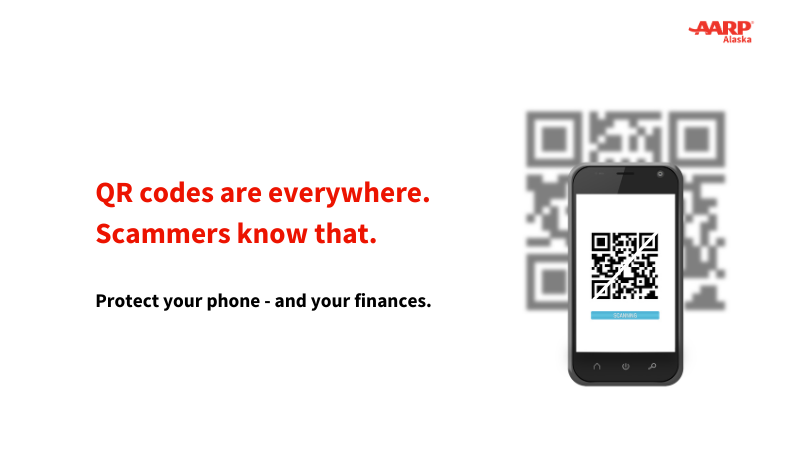AARP Hearing Center
by Michelle Tabler, AARP Alaska Volunteer Fraud Education Expert

A friend of mine was recently scammed while parking in downtown Anchorage. While parking in a downtown lot, he used the QR code on the sign in the lot to pay his fee. He was in a hurry, so he didn’t notice that the code took him to a fake website. Scammers had pasted an imposter QR code on top of the authentic parking authority sticker. I wasn’t even aware of QR code scams until I heard his story! My friend caught the scam but spent significant time contacting his bank and taking steps to protect his finances and his identity.
QR (quick response) codes are popping up everywhere these days – you see them on TV during commercials, in parking lots, at restaurants, or even for getting into concerts or sporting events. They started out in Japan to keep track of vehicles during manufacturing, but they really took off during the COVID-19 pandemic as a touchless way to share information.
But watch out! Scammers have figured out how to use QR codes to get into your financial and credit card accounts and steal your personal information. They create fake QR codes to redirect you to scam websites where they can swipe your bank details.
Here’s how you can avoid becoming a victim: Don’t scan any QR code that looks tampered with. When you scan a QR code with your phone, take a good look at the URL (web address) to make sure it matches the business and doesn’t have weird spellings or inconsistencies. If it seems fishy, don’t click on it. Never scan QR codes from unsolicited texts or emails. No matter what, it’s always critical to keep your phone’s security updates current. You can usually check to see if you need to update your software in the “Settings” app on your phone. And lastly, an important lesson from my friend’s experience: don’t rush! Scammers often count on you being in a hurry and not double-checking before you hand over your credit card info.
If you do get scammed, report it to your bank or credit card company right away. You should also report it to the associated business, like the owner of the downtown parking lot. If you or a loved one has been targeted by a scam or fraud, you are not alone. Fraud specialists at the AARP Fraud Watch Network Helpline (877-908-3360) can provide free support and guidance on what to do next. Your call also helps AARP and our federal, state and community partners to spot trends and respond to emerging threats. You can also report your experience and see reports from around Alaska on the AARP Scam Tracking Map (just search “AARP Fraud Watch Network scam map” and you’ll be redirected to the page).
To learn more about fraud, scams, and prevention, visit the AARP Fraud Watch Network at aarp.org/fraud. Remember: if you can spot a scam, you can stop a scam!































































